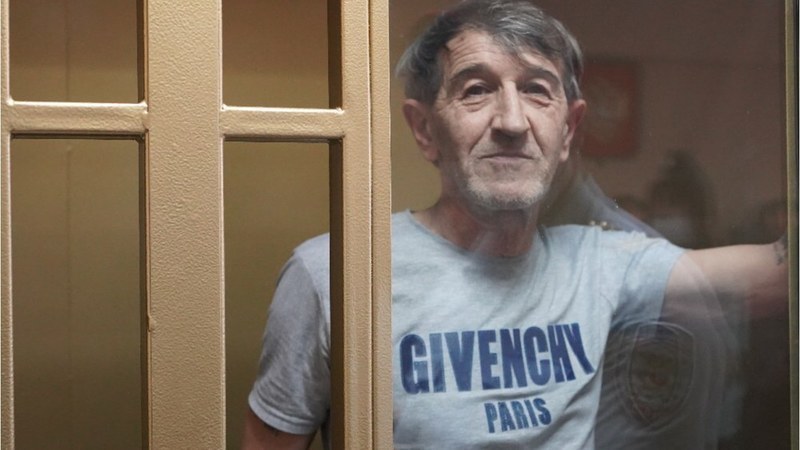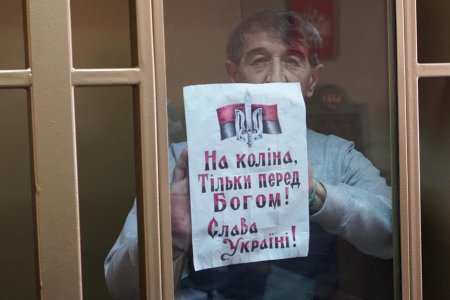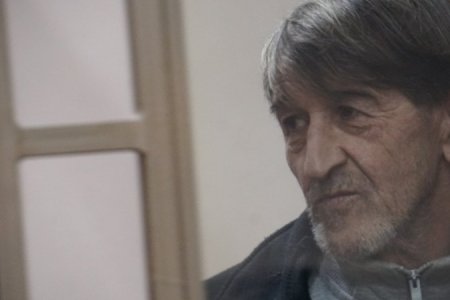
Russia clearly has no intention of releasing recognized Ukrainian political prisoner Oleh Prykhodko (b. 1958) who has been imprisoned either in occupied Crimea or in Russian prisons since October 2019. The 64-year-old’s exact whereabouts are unknown, but his family have been told that he is in a SZIO [pre-trial prison] since new charges have been brought against him. Since Prykhodko’s former lawyer is no longer representing him, another lawyer is urgently needed.
Prykhodko’s daughter, Natalia Shevtsova has told the Association of Political Prisoners’ Relatives that she and her mother tried to visit Prykhodko back in January this year. They made the long journey to the Vladimir Prison in Russia only to be refused entry. They were told that the ‘investigator’s’ permission was needed as new criminal proceedings had been initiated against her father. The ‘investigator’ promised to get a permit to them that day, yet only sent it in the evening. Since that was a Friday, with the weekend ahead, they were unable to use it and forced to return home without seeing Prykhodko.
Natalia adds that her father recently rang them from somebody else’s telephone, while in a SIZO in Krasnodar. Due to the lack of a lawyer, they can’t find out what the new charges are about and whether exactly her father is imprisoned. They need to organize a new lawyer, she says, but do not have the money.
Oleh Prykhodko was the first of several Crimeans arrested soon after Moscow released 35 Ukrainian political prisoners, including Oleh Sentsov, mainly in exchange for a crucial MH17 witness, Volodymyr Tsemakh, whom Russia needed to keep away from the Dutch prosecutors.
FSB officers turned up at Prykhodko’s home in Orekhovo in the evening of 9 October 2019. Prykhodko was arrested then, and initially charged with planning to blow up the Saki City Administration building. It was claimed that the FSB had ‘found’ explosives in a bucket in one of Prykhodko’s two garages. The case, from the outset, bore a suspicious similarity to the earlier persecution of Volodymyr Balukh, one of the political prisoners just released, Both prosecutions were based on ‘evidence’ allegedly found during unexplained ‘searches’ at the homes of men whose open opposition to Russian occupation had already made them the targets of several searches and other forms of harassment and meant that they would have anticipated further FSB visitations. Prykhodko also used his garages for welding and soldering work, and would hardly have left flammable substances near such equipment. The other grounds for doubting the FSB claim was provided by the FSB themselves. Although Prykhodko has two garages, the FSB only searched one – behaviour that only makes sense if they knew perfectly well that the sole ‘incriminating evidence’ was that which they had brought with them and already ‘discovered’.
No attempt was ever made to explain how Prykhodko had, allegedly, obtained such explosives, nor did the ‘court’ seek to ascertain why the prosecution seemed uninterested in such an important detail.
Three months later, the prosecution came up with a second charge. Prykhodko was accused of having planned to set fire to the Russian general consulate building in Lviv, Western Ukraine, with the alleged ‘proof’ of this lying in a telephone and a memory stick. It was claimed that Prykhodko had, over the phone and through text messages, discussed plans to carry out a terrorist attack on the Russian consulate in Lviv.
The defence produced clear proof (including billing records) that the alleged ‘evidence’ for this bizarre charge had been falsified.
All of this was ignored by Russian prosecutor Sergei Aidinov who demanded a huge 11-year sentence, as well as by presiding ‘judge’ Alexei Abdulmazhitovich Magomadov; together with Kyrill Nikolayevich Krivtsov and Sergei Fedorovich Yarosh from the notorious Southern District Military Court in Rostov-on-Don (Russia). On 3 March 2021, they found Prykhodko guilty of all charges, however removed the charge under Article 223.1 (preparing explosives) as being time-barred. Prykhodko was sentenced to five years’ harsh-regime imprisonment with the first year in a prison, the worst of all Russian penal institutions. He was also fined 100 thousand roubles.
An additional charge of ‘contempt of court’ (under Article 297 § 2 of Russia’s criminal code) was brought against Prykhodko after the initial sentence in March 2021. This was based on two incidents during the ‘trial’. One was when FSB officer Vladimir Stetsik gave ‘testimony’ about how he had supposedly found the explosives. Prykhodko’s language was extremely strong, and he was removed from the courtroom until the end of Stetsik’s questioning. Prykhodko later reacted with equally bad language when FSB officer Ivan Romanets said that he did ‘not remember’ the man who, in the first hours after his arrest, claimed to be a doctor and tricked Prykhodko into providing DNA without a lawyer present. That DNA was later claimed to have been found on the explosives. In the Spring of 2022, judge Konstantin Zaderko found him guilty of contempt of court, adding one month to the sentence Prykhodko was already serving.
In April 2021, the renowned (and now forcibly dissolved) Memorial Human Rights Centre declared Oleh Prykhodko a political prisoner. They found the case against the Ukrainian activist falsified and lacking in any elements of a crime. It was clear, they said, that he had been arrested and tried purely because of his political views, in particular his unwavering opposition to Russia’s occupation of his native Crimea.
There is every reason to believe that any new charges brought while Prykhodko remains imprisoned will also be politically motivated and aimed solely at extending the 65-year-old Ukrainian patriot’s captivity.



